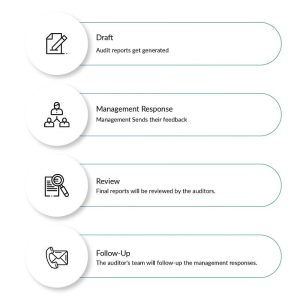Internal Audit
Internal auditing makes ensuring that company goals and objectives are achieved as well as that the organization is operating fairly enough to reduce risks. Internal auditors collaborate with an organization to methodically examine its systems and business operations to accomplish this. The main goals of these evaluations are to evaluate how effectively risks are handled and whether established processes are being followed.
Internal auditing is a technique that allows for a complete and in-depth study and analysis of a business. The internal audit is carried out to determine the company’s current state and to confirm that the organization is adhering to all compliance regulations set forth by the relevant authorities.
One of the two types of audits that a business can perform is an internal audit. This kind of audit is typically carried out by companies with strong financial support. Such a company is also capable of creating and maintaining its audit department. This will enable the management to conduct an audit quickly following the needs and specifications of the business.

BRINGING CLARITY FROM COMPLEXITY
Global Strategic Partners Union
services for a global network of creators
We gives you unmatched agility without compromising on experience
1

Branding & identity
It has survived not only five centu ipsum duos.

Data engineering
It has survived not only five centu ipsum duos.
2

Project planning
It has survived not only five centu ipsum duos.
3

HR support
It has survived not only five centu ipsum duos.
4
Need for Internal Auditing
- Improves operational effectiveness
Periodically, an internal audit analyses the policies and practices of your company. These procedures aid in reducing your company’s risk. You can find suggestions to increase the efficiency of business operations thanks to ongoing monitoring and review.
- Assesses risks and safeguards assets
Through a methodical risk assessment, an internal audit program helps management and stakeholders identify hazards. Any weaknesses in the company environment can be identified and remedied with the use of a risk assessment.
- Successful Control
Internal audit reduces business risks, which increases organizational efficiency. The management can find the best solutions to the main company risks with the help of regular auditing.
- Makes sure that corporate laws and regulations are followed
Internal audit aids in getting your business ready for an external audit. Internal audits conducted regularly will make it simpler to draught legal documents.
Internal Auditing Benefits
- Internal auditing aids in performance analysis by assisting a company in evaluating its effectiveness and efficiency.
- By proactively identifying any irregularities or inconsistencies in a company’s operations or reporting, it can serve as a proactive tool for risk management.
- An organization can examine its most important business processes with the aid of internal auditing, giving it the chance to grow and get better over time.
Process of internal auditing
Although the audit requirements vary depending on the business, the audit process, which consists of nine steps, is generally the same. The following procedures are carried out by audit companies to reduce business risks and boost productivity inside an organization:


Internal Auditing Services at GSPU
The following internal auditing services are offered by our auditing company:
- Assessing company risks and making appropriate recommendations.
- Compliance auditing, which provides management with information on the level of adherence to established policies, procedures, laws, rules, contractual requirements, etc.
- Analyzing business operations to evaluate how well the organization performs concerning its business goals.
- Giving guidance and aiding the company in the creation of internal audit and risk methods.
- Helping the management identify and assess any financial irregularities, as well as gathering any documentation needed for legal proceedings.
- Evaluating a company’s internal control systems, assuring the conformity to local laws and regulations, and verifying compliance with operational guidelines.
- Finding potential sources of side income and any holes in the current revenue streams
- Delivering helpful suggestions for enhancing control systems
Why WE?
We provide both interim and full-time internal auditing at GSPU. To assist clients in enhancing performance and operational effectiveness, our internal audit professionals use a risk-based approach to internal audit. To raise internal audit to a position even more strategic and beneficial in the current corporate governance climate, we go beyond standard fundamentals and bring concrete value.
Regarding the calibre and efficacy of the control environment within the organization, we offer an unbiased expert assessment and recommendations. We also pinpoint opportunities for development and put plans into place to assist you in achieving your organizational goals and positively impacting the efficient running of your company.
Internal auditing is an impartial, independent assurance and consulting process intended to bring value and enhance business operations. Applying a methodical, disciplined approach to assess and enhance the efficiency of risk management, control, and governance processes aids the firm in achieving its goals.
The goal of the profession of internal auditing is to enhance an organization’s operations. It assists an organization in achieving its predetermined objectives and goals through a systematic approach to studying and enhancing the effectiveness of risk management, control, and governance processes. It is carried out by certified internal auditors with in-depth knowledge of the business environment, systems, and processes.
Internal auditing makes ensuring that company goals and objectives are achieved as well as that the organization is operating fairly enough to reduce risks. Internal auditors collaborate with an organization to methodically examine its systems and business operations to accomplish this. The main goals of these evaluations are to evaluate how effectively risks are handled and whether established processes are being followed.
An internal auditor will have access to all the necessary records and be able to assess the expansion of the business. The audit will assist a business in discovering any irregularities in how its operations are carried out and will also offer a remedy to any such concerns so that they do not reoccur in the future.
Internal audit is crucial for a corporation for the following reasons:
- It supports upholding all legal criteria for compliance.
- It aids in assessing any current or potential risks and future business planning.
- It will enable enterprises to maintain their course and notify management of any deviations.
- It is one of the most important tasks since it will enable management to decide how to manage the business operations.
A corporation can choose from several different kinds of corporate audits. The management should exercise caution when deciding which sort of audit is best for the business. Internal audits and external audits are the two types of audits that companies utilize the most commonly.
Both of these audits will inform management of the many corporate matrices and assist in helping to determine the future course of the organization, but the outcomes provided by each audit will vary.
In an internal audit, a department specifically charged with conducting the company audit will be led by a person currently employed by the company. As this form of an audit will be carried out by a person who is already a member of the firm and is familiar with its workings and processes, the management will receive extensive detail regarding the internal operations of the business.
However, since no one else will be present to supervise the audit, the likelihood of fraud is higher in this scenario. After completing an internal audit, the management can undertakean external audit because it will provide more information about the company and will also look at the data gathered during the company’s internal audit.
The management of the company undertaking the internal audit should understand both its goals and the outcomes of the audit. Internal auditing goals are:
- Measuring and Examining Compliance with Regulations
- Keeping a tight check on the company’s internal controls
- Foreseeing business hazards.
- Formulating Business Plans for the Future
- Asset Protection
When should a corporation do an audit is one question that concerns businesspeople. The management should anticipate a variety of possibilities when conducting the company’s audit, including the following:
- If the actual business data differs significantly from the estimate.
- There is a decline in the company’s cash flow.
- Before making any purchase.
- Whenever the ratio of staff turnover rises.
- Every so often or as decided.
The management of the organization should perform an audit of the business in these five (5) instances. The management of the company should be aware of the business requirements and choose the appropriate form of audit as needed. For this reason, it is advised that the management enlist the help of a reputable company to handle all of the business’s auditing needs.
SCALE NEW HEIGHTS OF SUCCESS WITH US
Expert business partner to ensure business success!!!
A reliable partner with a team of experts delivering advice on business challenges to ensure long-term success and credibility in 500+ Global Conglomerates across diversified sectors.
Bringing Clarity from Complexity
GSPU ADVISORY!
Simplifying complex structures reviewing the vital elements, and spotting effective tools for communication to assist clients make informed decisions and drive progress.

COMPATIBLE

CUSTOMISABLE

CONVENIENT






